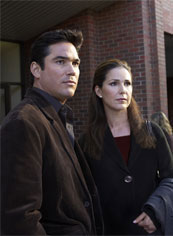I never had the chance to see “The Last King of Scotland,” which tells the tale of psychotic Ugandan dictator Idi Amin, when it first came out. I was expecting a very different movie than the one I saw when I watched it on DVD this week.
The movie is not so much a look inside the mind of a power-hungry madman as it is a powerful commentary about the consequences of everyday people ignoring the warnings of evil taking root. In light of current events such as the Virginia Tech shooting and the ongoing White House staff investigations, I found the movie especially thought provoking and worthy of discussion. So “Last King” is my DVD pick for this weekend.
“The Last King of Scotland” begins with Idi Amin’s ascendence into power after another Ugandan dictator had been overthrown. It then follows his government up until a few days before Amin himself is taken out of power and eventually exiled. However, the entire story is told through the eyes of a somewhat naive and morally shallow Scottish doctor, Nicholas Garrigan, and it could be argued that perhaps he is the one the title of the movie is referring to. The doctor originally comes to Uganda to do relief work, but soon finds himself a close advisor to Amin–a man who claims to love Scottish people for their brave warrior-like history.
What is affecting about this drama is that Garrigan is given numerous warnings by many others
around him that Amin is not the charming man Garrigan thinks he is. He is also warned that his association with Amin will end badly if he is not careful. Yet Garrigan, even as he sees Amin’s erratic behavior, continues to allow himself to be sucked into this privileged, insular world. When he does finally make a decision to escape from Amin, it is too late to do so.
The ending of the story seems to teach that change only happens when individuals stop ignoring signs of evil corruption and instead use their lives as a witness–sacrificially if necessary–to tell others about what is happening. Then the community can defend those who will be the victims of that corruption or evil. If we don’t, we are as guilty as the ones perpetrating the crimes.
It’s a truth that sounds so simple, but as we have been reminded this week in the news, is actually quite complicated. Or is it?


